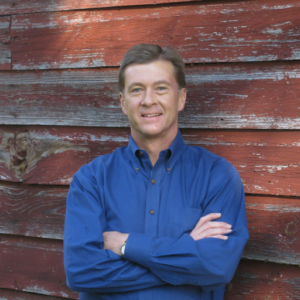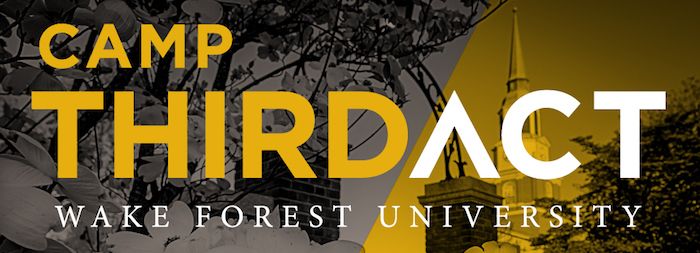Author and retired news anchor Cameron Kent (’79) is one of the scheduled speakers for the upcoming alumni workshop, Camp Third Act, June 8 – 9. Sponsored by the Alumni Engagement office, the workshop is designed to help alumni plan the next phase, or “third act,” in their lives after retiring from their primary career. Other speakers include Gregg Levoy, author of “Callings: Finding and Following an Authentic Life;” Bridget Facchine Holcombe (’79, P ’07, ’14), a career consultant in Wake Forest’s School of Business; and Ed Southern (’94), author and executive director of the North Carolina Writers’ Network. Kent, who retired from Winston-Salem’s WXII in 2016 to pursue his passion for creative writing, shares his insights into preparing for your third act. Register for Camp Third Act.
 You had written several novels before leaving WXII, so you already knew what you wanted to do next. How did you prepare for your next act?
You had written several novels before leaving WXII, so you already knew what you wanted to do next. How did you prepare for your next act?
My mantra is “Success comes when preparation meets opportunity.” If you want to accomplish something, you have to adopt a philosophy of management by objective. First, decide what it is you want to do, then start laying the groundwork. Research and educating yourself are major components of that. For example, you don’t just wake up on Friday and decide you want to run a marathon on Saturday. You begin months in advance by developing a training schedule, learning about the best shoes, the best diet, etcetera. You pick the brains of other marathoners to learn from their experiences. All that preparation over time leads to success on race day.
The same is true for any pursuit. For writing fiction, you first have to learn about things like story structure and formatting. You have to take classes and read articles on the craft of writing, and you have to read the works of great writers to see how they put a story together. You need to connect with other writers to learn about their process and see if it’s something you can apply to your own writing. You also have to educate yourself on the commerce side of writing, so you can sell and market your manuscript once it’s completed. You have to figure out what hardware you need. All those things that help you build your toolkit. It all goes back to preparation.
What if you aren’t sure what you want to do next?
I think the best way to create a new future is to experiment and experience in the present. Take classes, visit other worlds, meet new people from different walks of life. You’d be surprised how many other vocations and avocations there are that will bring you happiness and fulfillment.

What was your greatest challenge as you transitioned into your third act?
Going from a very public job that took place inside a noisy newsroom filled with dozens of people in constant motion to a very insular life where you’re working alone most of the time. For me it was a fairly easy transition, but it was a drastic shift in environment overnight. Even though writing is a creative pursuit, I don’t just do it when “the spirit moves me.” I still keep regular office hours and treat it like any other job.
I think the real danger is going directly from a full-time job to complete retirement. You don’t feel like you’re contributing to society or growing as a person if you don’t have something new and exciting to get you up in the morning. That’s why the “third act,” transitioning from your lifelong work into your passion, is so important. It can be a brand-new career or volunteering or mentoring or coaching, whatever you want it to be, but I believe your life still has to have purpose to give it meaning.
When you were a news anchor, you had to prepare a newscast every day. How do you judge “success” now?
The metrics in television news were pretty clear: how is your station doing in the ratings and how are you, as an on-air talent, doing in the market research? If the numbers aren’t there, you won’t be around for long. It’s different in the creative worlds of writing, painting or music. Certainly, sales figures and reviews are an indication of success, but I think the true measure comes from within. At the end of the day, you have to answer two key questions: 1) Did you accomplish your goal of completing a novel? (There are millions of half-written manuscripts collecting dust because the writer simply gave up.) 2) Are you happy with what you’ve written? Did you take the story that was in your head or on your heart for all those years and translate it onto paper in a way that leaves you satisfied and proud? If you can answer “yes” to those two fundamental questions, then you have succeeded.
"The real danger is going directly from a full-time job to complete retirement. That’s why the 'third act,' transitioning from your lifelong work into your passion, is so important."
What other advice do you have for alumni looking ahead to their third act?
First of all, don’t be afraid to fail. In order to succeed, you first have to make the attempt. Not trying at all is to ensure failure. Secondly, I honestly believe there’s no better preparation for this world than the liberal arts education we received at Wake Forest. That “first chapter” gave us all a window to so many varied pursuits: business, science, humanities, religion and so many more. If you chose one of those avenues for your “second chapter,” perhaps it’s now time to explore one of the others.


